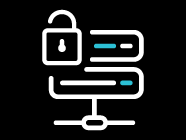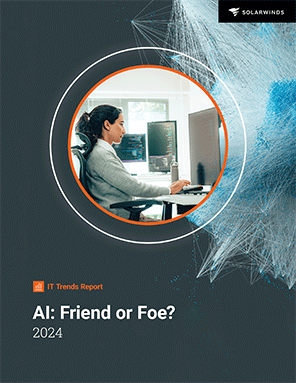Introduction

AI improves efficiency and productivity in IT teams
Most companies now have more tools and more data than they know what to do with. While these tools aid productivity at every level, they also spell huge headaches for CIOs, especially in the following areas:
-
 Environments are too complex
Environments are too complex -
 Workflows are too slow
Workflows are too slow -
 Processes are too costly
Processes are too costly -
 Data is not secure
Data is not secure
One of AI’s greatest strengths is its capacity to review large amounts of data—both as a one-time exercise and on an ongoing basis. What takes humans minutes, hours, or days to tackle, AIOps can complete in seconds, from analyzing traffic patterns to monitoring changes in the IT infrastructure over time.
We asked IT professionals how the integration of AIOps will affect their job experience.
Efficiency isn’t just one outcome of AIOps. It’s the critical outcome companies look for when investing in AI. Nearly half of respondents named improved efficiency as the most significant driving factor in their plans to implement AI technologies, ranking it above data analysis, cost savings, and predictive decision-making
Confidence in AI adoption and implementation is strong
AI is evolving rapidly, but investment from enterprise organizations is keeping up. Our research found that nearly two-thirds (65%) of companies have already invested $5 million or more in AI technology.
Companies may have good intentions of prioritizing AIOps for IT, but implementation is still in its early stages. As a result, IT professionals wish for more from their organizations when it comes to AIOps.
Security and privacy concerns run high
Despite IT pros’ high levels of optimism toward AI, not all of their feelings are positive. AI’s rapid advancement brings its fair share of concerns—and at the forefront are security and privacy.
-
 40% have had a negative experience
40% have had a negative experience -
 Nearly two-thirds (64%) of respondents’ organizations have developed internal frameworks to address concerns related to AI implementation
Nearly two-thirds (64%) of respondents’ organizations have developed internal frameworks to address concerns related to AI implementation -
 Nearly nine out of 10 (88%) respondents said they support increased government oversight of AI
Nearly nine out of 10 (88%) respondents said they support increased government oversight of AI
IT pros only somewhat trust data quality
Security and privacy aren’t the only AI concerns IT pros’ have. They also have uncertainty around data quality—and when the business is on the hook for the output of its AI systems, quality really matters.
Solving the problem of low-quality AI output, of course, starts with its input—a model is only as good as its training data. Organizations should rely on the foundations of data engineering:
-
 Data cleaning and validation
Data cleaning and validation -
 Anomaly detection to find outliers and anomalies in the data
Anomaly detection to find outliers and anomalies in the data -
 Data provenance, which is required for auditing and governance
Data provenance, which is required for auditing and governance
AI is a wise advisor, not a final decision-maker
If AIOps were an IT team member, who would it be? We asked respondents, and the largest group (33%) described their new “colleague” as a wise advisor—one that offers insights and foresight to refine decision-making. This response further supports the idea that AI has a role to play in making decisions; just not the primary one.
The second most common description of AI (20%) was that of a superhero sidekick who takes on the grunt work so that the hero can focus on the big picture.

AI: Friend or Foe? Get the 2024 IT Trends Report.
Delve into the discussion of whether artificial intelligence (AI) is our friend or foe, a topic that has fascinated the general public and IT professionals alike. As these technologies have evolved so too have our expectations and imagination for their potential.




